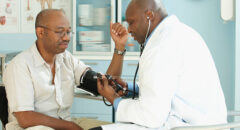 What are the most important at-home health checks for men and women? No one knows your body like you do—often it will give you warning signs when something is not quite right.
What are the most important at-home health checks for men and women? No one knows your body like you do—often it will give you warning signs when something is not quite right.
Doctors agree that carrying out a few simple health checks on a monthly basis can make all the difference when it comes to catching diseases early. All you need to do is look for the clues. The best way of doing this is by giving yourself regular, monthly checks in the privacy of your own home.
- Your Weight
Unexplained weight gain and weight loss can also signal a major issue with your health. Don’t ignore them. If you unexpectedly gain a lot of weight, this can signify hypothyroidism, adrenal disorders like Cushing’s syndrome, fluid retention as in congestive heart failure or renal disease, and pregnancy.
If you unexpectedly lose a lot of weight, this can signify cancer, hyperthyroidism, autoimmune diseases, chronic diseases, and depression.
What To Do: Check your weight every day. See if it fluctuates a lot in the span of 2 weeks. Try lifting your legs, is it harder to lift as time moves on? Is your waistline getting bigger? All of those are signs that say you need to do something about your weight.
2. Your Urine
Your first trip to the toilet in the morning can detect a lot more than pregnancy or a urinary tract infection. More than 70 markers in your urine can determine how your entire body is functioning and are key to preventing degenerative diseases, unknown gluten intolerance, low antioxidant levels that make you vulnerable to oxidative stress, and more.
For instance, accumulation of specific organic acids in urine often signals a metabolic inhibition or block. The abnormality could mean that you’re vitamin deficient.
What To Do: Is your urine smelly? Does it have a strong odor? Is it dark yellow? The darker the urine, the worse your health could be. Drink only water as your beverage for a few days to see if it clears it up.
3. Your Bowels
Don’t be shy; peering into the toilet can save your life. Check for any changes in bowel habits and go to your doctor if constipation or diarrhea continues for more than two weeks. Examine stools for signs of blood (although this can be due to piles). The appearance of a black tarry substance in stools may show that blood is leaking.
What To Do: Look at your stools, do they float? Are the more solid or runny? The more solid and nature-like (brownish, dark green) the better. If not, you may need to change your diet. Also, write down how often you go to the bathroom. That helps.
4. Your Underarms
Your underarms are a great place to begin when it comes to your health. Are your underarms swollen or tender to the touch? Are they redish? How do the hairs look at your underarms? Also, look at the skin to make sure there are no marks or abnormal growths
What To Do: Check your underarms before and after putting on deodorant, monitoring any changes that may occur on your skin or how you feel. Also, check your deordorant to make sure it doesn’t have too much aluminum in it (it has been ties to Alzheimer’s disease).








